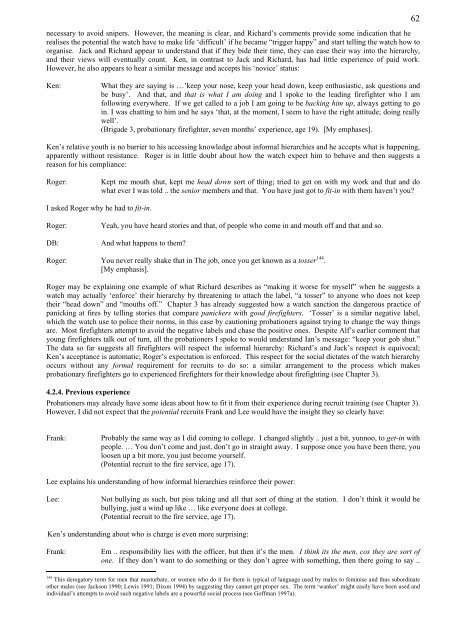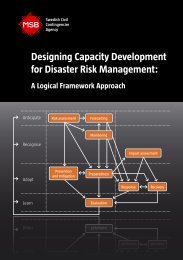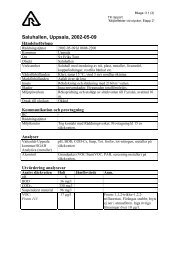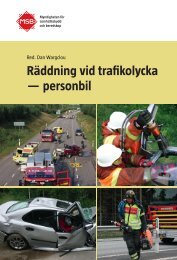One more last working class hero
One more last working class hero
One more last working class hero
You also want an ePaper? Increase the reach of your titles
YUMPU automatically turns print PDFs into web optimized ePapers that Google loves.
necessary to avoid snipers. However, the meaning is clear, and Richard’s comments provide some indication that he<br />
realises the potential the watch have to make life ‘difficult’ if he became “trigger happy” and start telling the watch how to<br />
organise. Jack and Richard appear to understand that if they bide their time, they can ease their way into the hierarchy,<br />
and their views will eventually count. Ken, in contrast to Jack and Richard, has had little experience of paid work.<br />
However, he also appears to hear a similar message and accepts his ‘novice’ status:<br />
62<br />
Ken:<br />
What they are saying is …’keep your nose, keep your head down, keep enthusiastic, ask questions and<br />
be busy’. And that, and that is what I am doing and I spoke to the leading firefighter who I am<br />
following everywhere. If we get called to a job I am going to be backing him up, always getting to go<br />
in. I was chatting to him and he says ‘that, at the moment, I seem to have the right attitude; doing really<br />
well’.<br />
(Brigade 3, probationary firefighter, seven months’ experience, age 19). [My emphases].<br />
Ken’s relative youth is no barrier to his accessing knowledge about informal hierarchies and he accepts what is happening,<br />
apparently without resistance. Roger is in little doubt about how the watch expect him to behave and then suggests a<br />
reason for his compliance:<br />
Roger:<br />
Kept me mouth shut, kept me head down sort of thing; tried to get on with my work and that and do<br />
what ever I was told .. the senior members and that. You have just got to fit-in with them haven’t you?<br />
I asked Roger why he had to fit-in.<br />
Roger:<br />
DB:<br />
Yeah, you have heard stories and that, of people who come in and mouth off and that and so.<br />
And what happens to them?<br />
Roger: You never really shake that in The job, once you get known as a tosser 144 .<br />
[My emphasis].<br />
Roger may be explaining one example of what Richard describes as “making it worse for myself” when he suggests a<br />
watch may actually ‘enforce’ their hierarchy by threatening to attach the label, “a tosser” to anyone who does not keep<br />
their “head down” and “mouths off.” Chapter 3 has already suggested how a watch sanction the dangerous practice of<br />
panicking at fires by telling stories that compare panickers with good firefighters. ‘Tosser’ is a similar negative label,<br />
which the watch use to police their norms, in this case by cautioning probationers against trying to change the way things<br />
are. Most firefighters attempt to avoid the negative labels and chase the positive ones. Despite Alf’s earlier comment that<br />
young firefighters talk out of turn, all the probationers I spoke to would understand Ian’s message: “keep your gob shut.”<br />
The data so far suggests all firefighters will respect the informal hierarchy: Richard’s and Jack’s respect is equivocal;<br />
Ken’s acceptance is automatic; Roger’s expectation is enforced. This respect for the social dictates of the watch hierarchy<br />
occurs without any formal requirement for recruits to do so: a similar arrangement to the process which makes<br />
probationary firefighters go to experienced firefighters for their knowledge about firefighting (see Chapter 3).<br />
4.2.4. Previous experience<br />
Probationers may already have some ideas about how to fit it from their experience during recruit training (see Chapter 3).<br />
However, I did not expect that the potential recruits Frank and Lee would have the insight they so clearly have:<br />
Frank:<br />
Probably the same way as I did coming to college. I changed slightly .. just a bit, yunnoo, to get-in with<br />
people. … You don’t come and just, don’t go in straight away. I suppose once you have been there, you<br />
loosen up a bit <strong>more</strong>, you just become yourself.<br />
(Potential recruit to the fire service, age 17).<br />
Lee explains his understanding of how informal hierarchies reinforce their power:<br />
Lee:<br />
Not bullying as such, but piss taking and all that sort of thing at the station. I don’t think it would be<br />
bullying, just a wind up like … like everyone does at college.<br />
(Potential recruit to the fire service, age 17).<br />
Ken’s understanding about who is charge is even <strong>more</strong> surprising:<br />
Frank:<br />
Em .. responsibility lies with the officer, but then it’s the men. I think its the men, cos they are sort of<br />
one. If they don’t want to do something or they don’t agree with something, then there going to say ..<br />
144 This derogatory term for men that masturbate, or women who do it for them is typical of language used by males to feminise and thus subordinate<br />
other males (see Jackson 1990; Lewis 1991; Dixon 1994) by suggesting they cannot get proper sex. The term ‘wanker’ might easily have been used and<br />
individual’s attempts to avoid such negative labels are a powerful social process (see Goffman 1997a).
















